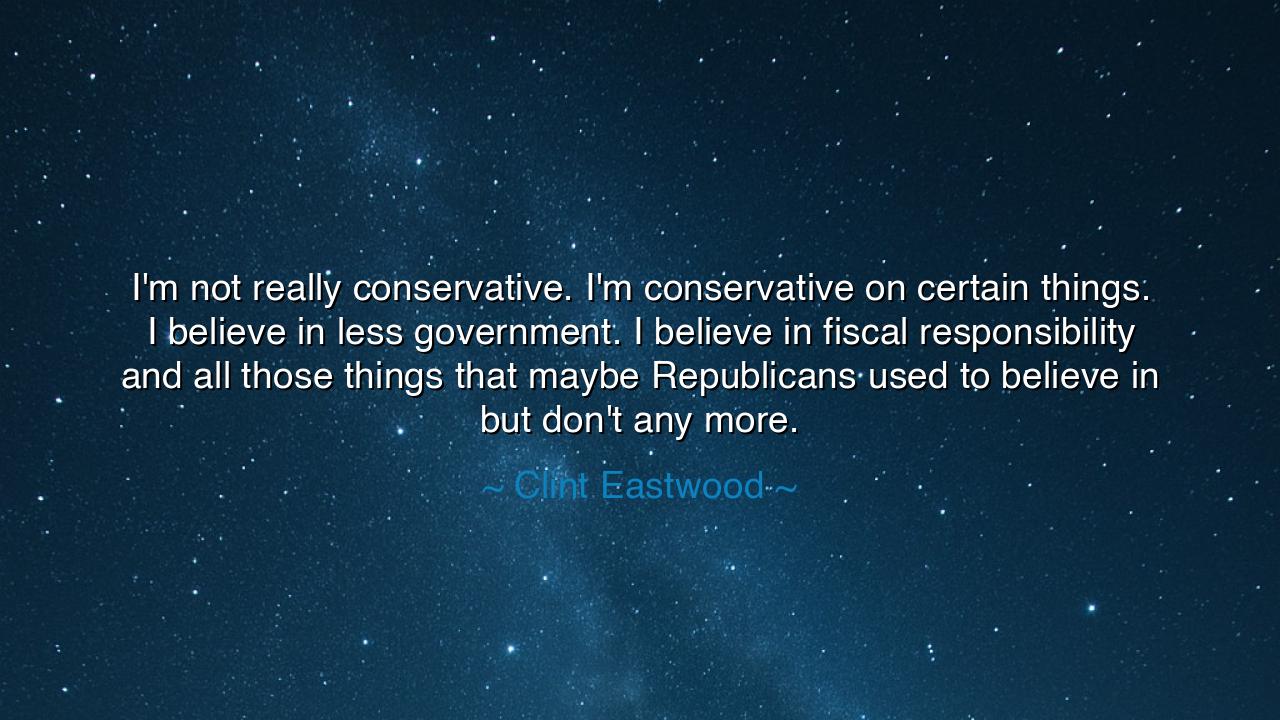
I'm not really conservative. I'm conservative on certain things.
I'm not really conservative. I'm conservative on certain things. I believe in less government. I believe in fiscal responsibility and all those things that maybe Republicans used to believe in but don't any more.






The words of Clint Eastwood, spoken with the simplicity of a man who has seen much of life and refuses to be swayed by empty labels, ring with the clarity of reason: “I’m not really conservative. I’m conservative on certain things. I believe in less government. I believe in fiscal responsibility and all those things that maybe Republicans used to believe in but don’t any more.” In this statement, Eastwood, an artist, actor, and man of the American West, distills the essence of what once defined principled independence—the belief that wisdom lies not in blind loyalty to a party, but in fidelity to enduring truths. His words echo the ancient counsel of the philosophers: beware of the tribe that replaces thought with obedience.
The origin of this quote rests in the twilight of modern politics, when Eastwood, long admired for his rugged individualism, was asked to define his beliefs amid the shifting tides of partisanship. A man shaped by both the frontier spirit and the introspection of age, he rejected the easy labels of left or right, choosing instead to measure all things by the compass of responsibility. He had lived through the transformation of American conservatism—from the lean, self-reliant ethos of small government to a bloated stage where ideology often replaced integrity. His words were not a rebuke of one side alone, but of the loss of balance, the forgetting of what it means to govern with restraint and moral courage.
In the style of the ancients, let us interpret this as a lesson on temperance—the virtue of moderation that guards the soul against both excess and neglect. Eastwood’s call for less government is not a cry for chaos or neglect of duty, but a reminder that true governance begins not with control, but with trust in the people. The government that seeks to manage every thought and habit of its citizens diminishes their strength; but a government that governs lightly, allowing men and women to bear the weight of their own choices, cultivates virtue. This was the vision of the Founding Fathers, who saw liberty as a flame best protected by humility in power.
And when Eastwood speaks of fiscal responsibility, he is not merely speaking of numbers and budgets, but of a moral economy—the understanding that waste and greed, whether by government or individual, erode the foundations of freedom. The ancients knew this well. In the fall of the Roman Republic, extravagance replaced simplicity, and public debt grew as fast as public corruption. Citizens who once prized labor and frugality came to expect comfort without sacrifice. Thus the republic that conquered the world could no longer govern itself. Eastwood’s lament mirrors that same ancient warning: when a people forget responsibility, they forfeit independence, and when leaders forget restraint, they invite decay.
In a way, Eastwood’s statement is also an elegy for a lost political integrity. He recalls a time when parties were not tribes of anger but assemblies of ideas—when Republicans, as he says, “used to believe” in certain principles: limited government, personal accountability, and respect for the individual’s right to succeed or fail by his own effort. But over time, those beliefs, like the weathered timbers of an old ship, began to rot beneath the weight of hypocrisy and ambition. In this, Eastwood does not curse the ship itself, but calls for its restoration—to scrape away the barnacles of corruption and rediscover the keel of honesty and balance upon which it once sailed.
History offers a powerful reflection of this truth. Consider the statesman Cincinnatus of ancient Rome—a farmer called to lead his people in crisis. When victory was won, he laid down his power and returned to his plow, refusing the trappings of tyranny. His humility was his greatness, his restraint his glory. He governed because duty required it, not because he craved control. This is the spirit Eastwood invokes when he speaks of less government—not the absence of authority, but the presence of honor in those who wield it. Power, unrestrained by humility, becomes corruption; but restraint guided by purpose becomes greatness.
Thus, my children of thought and freedom, the teaching of Clint Eastwood is both modern and eternal: beware of extremes, and cherish balance. Do not let parties, movements, or slogans enslave your reason. Stand for principle, not for tribe. Demand from your leaders what you demand of yourself—responsibility, discipline, and humility. And when you speak of freedom, remember that it thrives not in the abundance of laws, but in the restraint of rulers; not in reckless spending, but in the wisdom to live within one’s means.
So let this wisdom endure: the truest form of conservatism is not allegiance to a banner, but allegiance to truth and accountability. The truest form of liberty is not the rejection of order, but the mastery of self. As Eastwood reminds us, one may be conservative on certain things and free in others, for the strength of a nation lies not in uniformity, but in independent minds guided by conscience. Strive, then, not to be ruled by parties, but to be ruled by principle—and let your life, like the words of Eastwood, stand as a testament to the timeless virtue of freedom tempered by wisdom.






AAdministratorAdministrator
Welcome, honored guests. Please leave a comment, we will respond soon